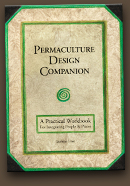Design :: Permaculture
 Permaculture is a toolkit to integrate land use, dwellings and natural ecosystems in a way that is permanently sustainable. By working with nature’s cycles, energies and resources, we can design our surroundings to meet our needs in a way that cares for the earth, people and allows individual conscience to determine what and how much we consume. Bill Mollison and David Holmgren, earth scientists, devised permaculture in the 1970s as a response to oil crises and realisation that there are limits to economic growth in a world of finite natural capital. They carefully observed natural systems that flourished and indigenous people that lived in harmony with their environment and came up with principles and practices to create such a world in our time.
Permaculture is a toolkit to integrate land use, dwellings and natural ecosystems in a way that is permanently sustainable. By working with nature’s cycles, energies and resources, we can design our surroundings to meet our needs in a way that cares for the earth, people and allows individual conscience to determine what and how much we consume. Bill Mollison and David Holmgren, earth scientists, devised permaculture in the 1970s as a response to oil crises and realisation that there are limits to economic growth in a world of finite natural capital. They carefully observed natural systems that flourished and indigenous people that lived in harmony with their environment and came up with principles and practices to create such a world in our time.
Three fundamental ideas emerged:
- Observation
- Permaculture principles and ethics
- Design process
Nearly 50 years later, permaculture is a huge topic and practiced in diverse ways. Many of the ideas are ancient and common sense and overlap with non permaculture activity. The essence remains that instead of using huge amounts of fossil fuels or hard graft, permaculture offers a third way: creative design with its unlimited yield of our imaginations. We can think of permaculture as a lens we can look through at a task or project, a tool to find solutions or a game we can play to make a plan.
Resources
There are tons of books, courses and films out there to find out more, some we can personally recommend are in the resources box below.
Introduction to Permaculture by Bill Mollison
The Permaculture Garden by G. Bell
Forest Gardening by R. Hart
Earth Care Manual by P. Whitefield
Earth Path by Starhawk
People Care by Looby Macnamara
Pattern Language by C. Alexander et al
Films:
Farm for a future
Global Gardener
La Belle Vert

